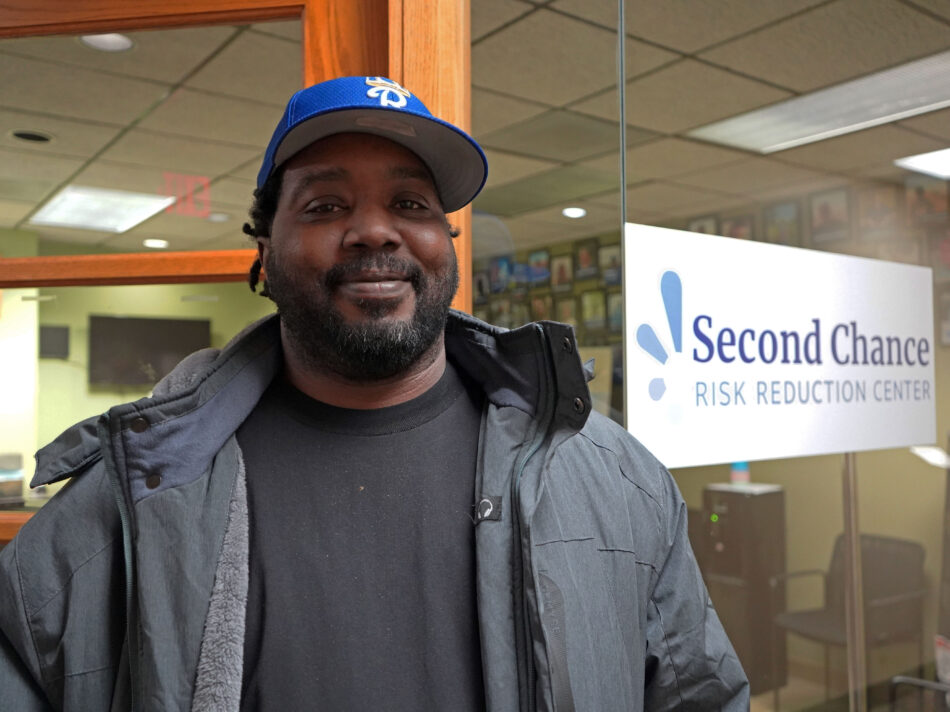
While Lamar was serving time for a drug-related offense, he lost his mother—the one steady family connection he had. When he was released, he had no home to return to and almost nothing to his name. He had reached his lowest point and didn’t know where to turn.
While searching for his next move, Lamar found the Second Chance Risk Reduction Center, an extension of the Kansas City Metropolitan Crime Commission, and enrolled in their reentry program. Geared toward helping individuals on parole for felonies in Jackson County, it was exactly the support he needed to make the changes he wanted to make in his life.
“Just the name itself, you know, it’s giving us a second chance and really trying to help us,” Lamar says. “I have visions, or inspiration, of where I want to go, but to have someone else see something bigger and better than you, it means something.”
One service that Second Chance provides is access to an on-site food pantry, which Harvesters helps keep in stock. Having access to consistent, nutritious food is crucial to everyone’s success in life, and particularly for those who are under a high amount of stress and restructuring their entire way of existing in the world. While he has been unemployed and staying in a guest room as he works toward self-sufficiency, the pantry helps take some of the financial burden off of himself and those he’s living with.
“It helps me to be able to bring something to the house because I don’t have a job. So at least I can do that part. Like, hey, I’m staying here, but here is a little extra food.”
During their time in the Second Chance program, participants have access to a wide range of services, such as help obtaining important documents like birth certificates and identification, help getting GEDs and pursing higher education opportunities, gaining access to physical and mental healthcare and job/life skills training. Lamar enthusiastically shares that his entire mindset has been transformed as he’s worked toward a better future through the program.
“You know, one door closes. If you focus on that door, then you won’t see the other doors opening around you. And doors have been opened. I just recently graduated with my forklift certificate. I’m about to start going to CDL school next month.”
Through therapy and Second Chance’s peer support groups, Lamar has become much more in touch with his own inner world and learned that his previous drug use was just a means, and at times an effective one, to cope with the trauma he experienced earlier in his life. Now, he’s reaching for new, healthier tools to move past it.
“You know, we all suffer from some form of PTSD or trauma in our life, but we all dealt with it in different ways, or we’re taught to deal with it in a different way,” he explains. “I wasn’t taught at all. So, if I went to drugs or whatever, that’s what I was taught to do. But now that I’ve overcome that, that’s not who I am.”
Lamar has grown close to his peers in the program as they have worked through their various challenges in community together. Though everyone’s story is different, many of them are in similar situations and come from similar backgrounds. Now, they have each other to cling to.
“I feel like we became family,” he says. “We give each other hugs. You know, when one of us does good, everybody’s happy and cheering them on. Because through struggle, you know, through pain, you bring joy one day anyway.”
Those with felony convictions often face stigma and distrust, both in personal and professional spaces. This can lead to being passed by for job opportunities, even if they are great candidates. Second Chance has partnerships with employers who are accepting of those with felonies, but Lamar thinks a paradigm shift is needed in the employment world to even the playing field for those who have made mistakes but are on a journey of change.
“People say ‘I’m going to give you the benefit of the doubt,’” he gives as an example. “Well, if you say that, then you’re already doubting me. Why don’t you just give me a chance? And if I mess up, that’s on me now. I could be the best employee you ever had. I will be, because I have everything to lose.”
Lamar says that the greatest gift he’s received since leaving prison and his old lifestyle behind is the restoration of his relationship with his children, aged 29, 27, 23 and 15. He has rebuilt trust as they’ve seen his growth and hard work, and they have become one of the main motivations for him to continue on his new path.
“Our relationship was kind of strained at first because of the way I was living,” Lamar says. “But now they’re calling me, pulling up on me wanting me to hang out, you know what I’m saying? And it feels good. It feels great to be able to be a father and not just a dad.”
Harvesters’ relationship with Second Chance is part of our Food+ program, in which we partner with organizations on the front lines of addressing the root causes of hunger in our community. Click here for more information about the program and our commitment to not only feed people experiencing hunger today but helping them to move past food insecurity altogether.
